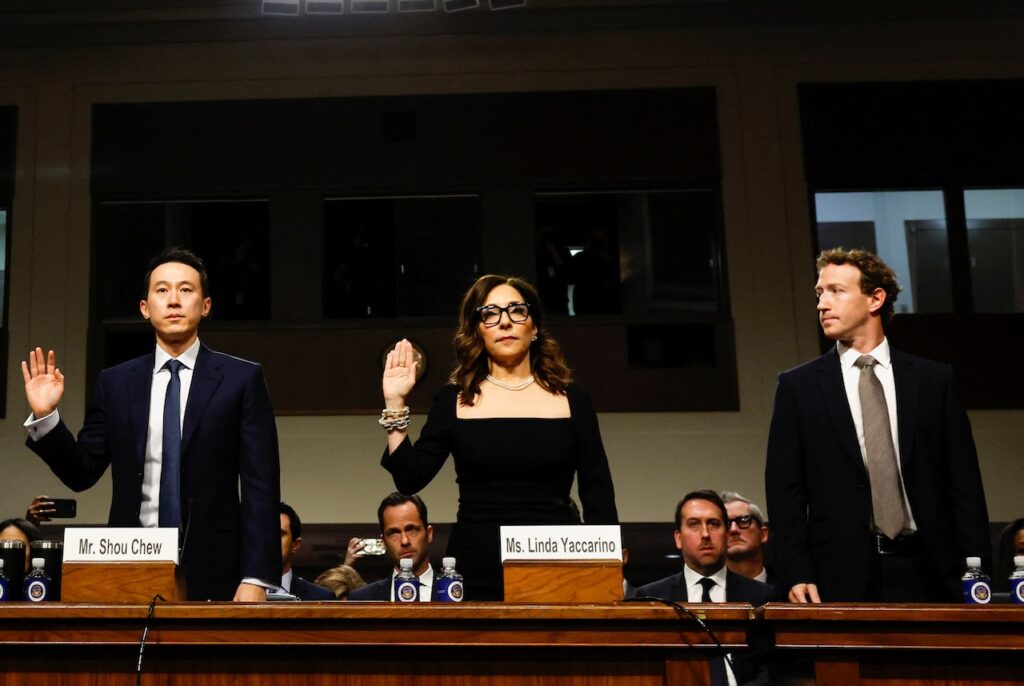WASHINGTON (OSV News) — The Senate Judiciary Committee Jan. 31 grilled the CEOs of major social media companies on how they respond to child sexual exploitation on their platforms.
“You and the companies before us —I know you don’t mean it to be so — but you have blood on your hands,” Sen. Lindsey Graham, R-S.C., said to Mark Zuckerberg of Meta, which owns Facebook, Instagram and WhatsApp. “You have a product that’s killing people.”
Zuckerberg, TikTok’s Shou Zi Chew, X Corp.’s Linda Yaccarino, Snap’s Evan Spiegel and Discord’s Jason Citron testified before the committee about child abuse material on their platforms. The latter three were under congressional subpoena after the committee said they did not comply with their oversight requests.
The office of Sen. Dick Durbin, D-Ill., chairman of the Senate Judiciary Committee, previously said the committee had to “enlist the assistance of the U.S. Marshals Service to personally serve the subpoenas” after X (formerly known as Twitter) and Discord refused electronic service of the subpoenas, which they called a departure from norm.
The hearing, although tense at times, was a rare moment of bipartisanship, with Durbin stating senators from “every spot on the political spectrum” had tough questions for them.
In his opening remarks, Graham, ranking member of the Senate Judiciary Committee, noted he was working closely with Sen. Elizabeth Warren, D-Mass., on the issue despite their differing political views. Graham and Warren have co-sponsored the Bipartisan Digital Consumer Protection Commission Act, which would create a new commission to regulate online platforms.
The National Center for Missing and Exploited Children said its CyberTipline received approximately 31.9 million reports of the possession, manufacturing or distribution of child sexual abuse material on the internet in 2022, marking an increase of about 47% from 2020.
Lawmakers expressed concern that the rise of artificial intelligence will only increase those numbers.
“That smartphone that can entertain and inform you can become a back alley, where the lives of your children are damaged and destroyed,” Durbin said.
The CEOs argued their companies have gone to great effort and expense to combat sexually exploitative materials on their platforms, particularly in regards to young people. But senators from both parties characterized their efforts as insufficient, noting the presence in the hearing room of abuse victims as well as family members of victims who have died by suicide.
In one notable moment, Sen. Josh Hawley, R-Mo., prompted Zuckerberg to address those families directly.
“You’re on national television. Would you like now to apologize to the victims who have been harmed by your product?” Hawley asked as the families of victims held up images of their deceased loved ones.
Zuckerberg stood to face them and said, “I’m sorry for everything you’ve all gone through.”
“Nobody should have to go through what your families have suffered,” he said. “This is why we have invested so much and are going to continue industry-leading efforts to make sure that no one has to go through the types of things your families have suffered.”
Lawmakers on both sides of the aisle argued that social media companies have been largely unregulated for too long and that Congress should address that problem.
“I don’t think you’re going to solve the problem. Congress is going to have to help you,” said Sen. John Kennedy, R-La.
Kennedy said the companies have wandered into the “foothills of creepy” by failing to adequately address the problem of abuse material.
“I just wonder if our technology is greater than our humanity,” Kennedy mused at one point. Durbin noted that comment later in the hearing, calling it “a fundamental question.”
“I would add to it: Are our politics greater than technology?” Durbin said. “We’re gonna find out.”
Senators argued that those harmed by the presence of such materials on social media should have more avenues for legal recourse.
Sen. Peter Welch, D-Vt., said, “It’s an astonishing benefit that your industry has that no other industry has.”
“They just don’t have to worry about being held accountable in court, if they’re negligent,” he said of the social media giants. “So you’ve got some explaining to do.”
Multiple senators on the committee signaled their intent to address the matter in legislation.
Sen. Tom Tillis, R-N.C., argued they should not be there to “make a point today,” but should focus “on making a difference.”
In 2023, the U.S. Conference of Catholic Bishops asked lawmakers to protect children online, but they did not endorse specific pieces of legislation. A June 6, 2023, letter from several committee chairs to congressional lawmakers asked them to keep in mind three moral principles in discerning a legislative response to protecting — all tenets of Catholic social teaching.
The bishops also asked Congress to be attentive to emerging research about the harmful effects of social media on young people, and said, “legislation to protect children online should address this threat.”
“We are grateful that Congress has begun to focus serious attention on this growing problem,” they wrote. “We encourage you to continue to use your authority effectively to protect children and vulnerable people online.”

